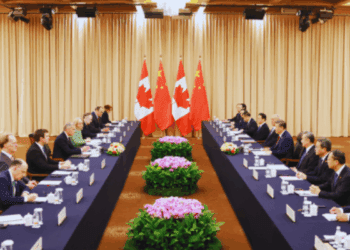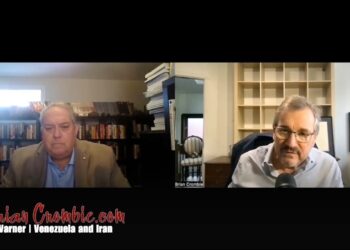October 27, 2012 – Is Canada sending conflicting signals, claiming on the one hand we are open for business and on the other looking askance at CNOOC? According to MLI’s Brian Lee Crowley, “We can be open for business but draw the line at “businesses” that are nothing of the sort, but are really agents of a foreign government and a rather intemperate impetuous government at that.” He adds, “We should judge China’s proposed investments on their merits, not because we fear they cannot be replaced. They can.” His Ottawa Citizen, Calgary Herald and Vancouver Sun column below (also republished in the Edmonton Journal):
Canada shouldn’t fear nixing Nexen purchase
By Brian Lee Crowley, Ottawa Citizen, October 27, 2012
There are many reasons we should think hard about whether to approve CNOOC’s bid for Calgary oil company Nexen. Getting cut off from capital we need to develop our resources isn’t one of them.
Especially in the wake of Ottawa’s turning down of Malaysia’s Petronas’s bid for Progress Corp, handwringing is the order of the day among the business community as the deadline looms for Ottawa’s ruling on the Nexen transaction. These decisions are creating uncertainty that will make oil companies very reluctant to invest in Canadian natural resources is the constant refrain from investment firms, financial journalists and the oil patch itself.
I’ve been known to make these arguments myself. All other things being equal, companies will prefer to deal with places where the rules are known, operate transparently and whose outcome is reasonably predictable. Let’s grant that that is not how one would describe the conditions for foreign investment in Canadian natural resources after Ottawa’s thumbs down on Petronas and BHP Billiton’s bid for Potash Corp in Saskatchewan a couple of years ago.
Still, the Nexen deal is one that could have long term consequences for Canada, since if approved it will form the template for bids that further state-owned Chinese oil companies will make for other oil patch assets. We are not approving a single transaction, but deciding whether we open to door to a significant change of ownership and control in the entire industry.
Is Canada sending conflicting signals, claiming on the one hand we are open for business and on the other looking askance at CNOOC? We can be open for business but draw the line at “businesses” that are nothing of the sort, but are really agents of a foreign government and a rather intemperate impetuous government at that. Just because you are in the market for investors doesn’t mean you give up the right to distinguish between capital from a chartered bank, pension fund or the stock market on the one hand, and the mafia on the other. We are entitled to know who we are dealing with.
Let’s suppose that we decide CNOOC and other Chinese state-owned oil enterprises aren’t people we really care to do business with, perhaps because they are Iran sanctions-busters, or they’re best buddies with Sudan’s ruthless regime or their parent company, China Inc., has a wretched record of stealing the intellectual property of western companies and is engaged in active espionage against Canadian companies and governments, or any one of a number of other reasons. Will our access to capital to develop our natural resources dry up?
If it did, it would certainly deal a mortal blow to Canada’s hopes to turn its natural resources into the foundation stone of a thriving economy. The opportunity that the natural resource economy offers us to achieve reconciliation with Aboriginal peoples would be imperilled. A vast source of tax revenue would be lost. We would be undeniably impoverished.
How likely is it, then, that sending China packing would unleash these dire consequences?
The likelihood is approximately zero.
Consider that, according to the Alberta government’s official website, the oilsands will require about $218 billion in capital investment over the next 25 years. Sounds like a lot. But it’s less than $10 billion a year. By contrast, says Wikipedia, the assets of the global fund management industry increased 10% in 2010 (the latest year for which we have figures) to reach a record $79.3 trillion. So this global pool of capital increases by roughly $7 trillion to $8 trillion a year. And the oilsands need a microscopic 0.14 percent of that.
The world is not short of capital. It is awash in capital hungry for a decent return. The oil sands need billions in investment. In exchange investors will be able to turn into cash the third largest reserves of oil in the world. There is good money in bitumen. That will ensure that the capital needed to develop those resources is forthcoming.
Remember too that oil companies the world over invest in circumstances far more trying than Canada’s humble foreign investment review process. Oil companies endure the risks of armed rebellion, insurrection, kidnapping of executives, corrupt officials, uncompensated nationalizations and far worse. BP’s leading executive in Russia had to flee the country in 2008 in fear for his safety. In Nigeria armed gangs attack Shell’s pipelines and other facilities. And still the companies come.
Go to Calgary and you will find companies from all over the world (France’s Total, Britain’s BP, America’s Exxon Mobil, Norway’s Statoil and more). As long as there is money to be made, capital will flow in and oil will flow out.
We should judge China’s proposed investments on their merits, not because we fear they cannot be replaced. They can.
Brian Lee Crowley is the Managing Director of the Macdonald-Laurier Institute, an independent non-partisan public policy think tank in Ottawa: www.macdonaldlaurier.ca. @MLInstitute
—




